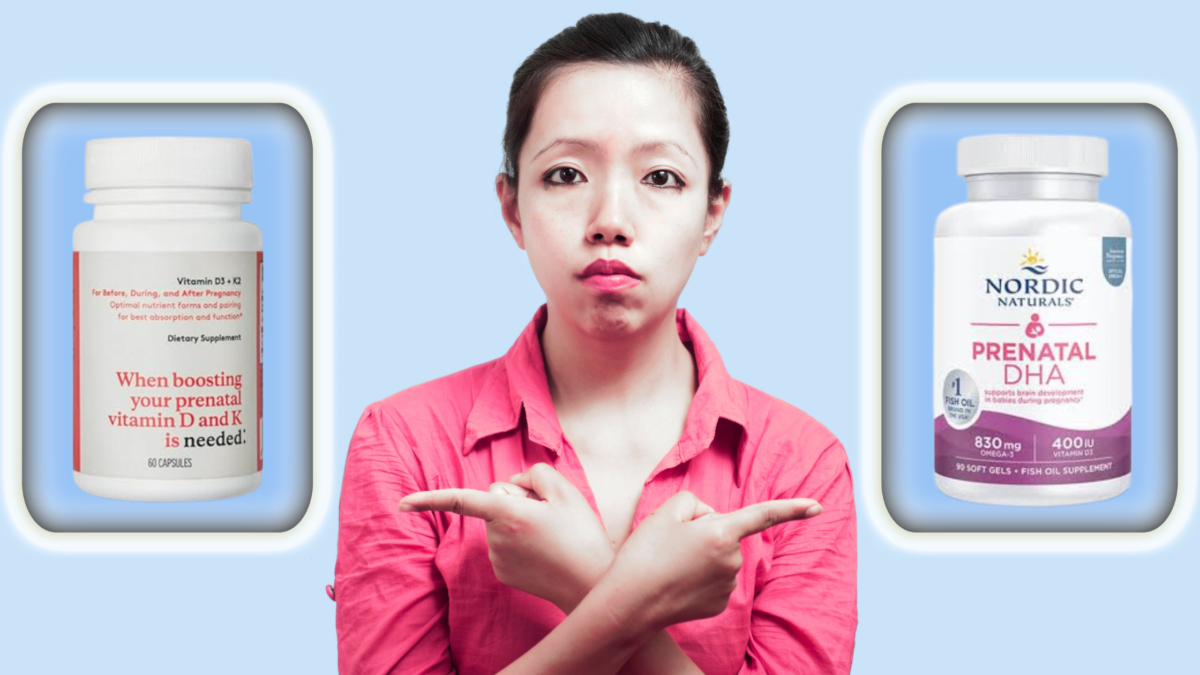Are Prenatal Vitamins for Everyone?

Medically Reviewed By Margaret Etudo, BPharm. Written By The Vitamins For Woman Team.
Should I be taking prenatal vitamins? Are prenatal vitamins good for everyone? This article will share more information on prenatal vitamins, including when to start taking them, common myths and potential side effects of using them during pregnancy.
Table of Contents
During pregnancy, your daily intake of essential nutrients increases. Taking prenatal vitamins and eating a balanced diet will provide all the necessary vitamins and minerals. Vitamins and minerals such as iron, calcium, and folic acid are vital for proper fetal growth and development.
In this article, we will discuss what prenatal vitamins are, if they are for everyone, and when to take them. We have also included prenatal vitamins vs multivitamins, myths, side effects and perks of prenatal vitamins.

What Are Prenatal Vitamins?
Prenatal vitamins are multivitamins specially formulated to meet your nutritional needs before and during pregnancy. They often supply sufficient nutrients you do not get from your diet. Prenatal vitamins contain vitamins and minerals like folic acid, iron, calcium, choline, omega-3 fatty acid and vitamin D.
These nutrients are generally needed for the healthy growth and development of your baby. This covers vitamins that significantly affect your baby’s spine, bone, brain, and red blood cell development.
While it may be challenging to know if these symptoms are from pregnancy or prenatal vitamins, some pregnant women react to the omega-3 fatty acid docosahexaenoic acid (DHA) or fish oil in prenatal vitamins. Gassiness may come from what you are before or while taking prenatal vitamins.
Prenatal Vitamins VS Traditional Multivitamins
Prenatal vitamins are similar to traditional multivitamins. However, they cater to specific nutritional needs. Here is a breakdown of prenatal vitamins and multivitamins:
- Target audience: Prenatal vitamins support the nutritional needs of pregnant women and their babies—the baby’s growth and development. Traditional multivitamins support overall health in men and women.
- Focus: Prenatal vitamins prioritize nutrients like folic acid, Vitamin B12 and iron to meet the increased pregnancy needs. Traditional multivitamins offer a variety of nutrients that meet general health needs.
- Folate content: Prenatal vitamins contain 600-800 micrograms (mcg) of folic acid. Traditional multivitamins contain 400 micrograms (mcg) of folic acid, as recommended for women who are not pregnant.
- Iron content: Prenatal vitamins contain 27 milligrams (mg) of iron. Traditional multivitamins contain 18 milligrams (mg) of iron, as recommended for women who are not pregnant.
- Additional vitamins and minerals: Prenatal vitamins contain sufficient amounts of choline and omega-3 acid. Traditional multivitamins contain little to no amounts of choline and omega-3 acid
When Should I Take Prenatal Vitamins?
You can start taking prenatal vitamins at least four weeks before you plan to conceive. The Centers for Disease Control and Prevention (CDC) recommends that women of childbearing age take folic acid daily.
As a pregnant woman, you should start taking prenatal multivitamins during the first three months. Your baby’s neural tube forms and develops into the brain and spinal cord in the first few weeks of pregnancy. The recommended daily dosage (RDA) of folic acid for pregnant women by the CDC is at least 400 mcg.
Can I Take Prenatal Vitamins if I Don’t Want to Get Pregnant?
Ideally, you should not take prenatal vitamins if you do not want to get pregnant. Prenatal vitamins are for pregnant women, not for everyone.
Eating a balanced diet rich in vegetables, fruits, and whole grains supplies you with the nutrients your body needs. You can take multivitamins as a supplementary source of these essential nutrients in the case of deficiency.
It is also important to note that there are potential side effects of taking prenatal vitamins. Excessive iron intake can cause constipation and inflammation of the stomach lining. Consuming high amounts of folic acid can mask vitamin B12 deficiency, which leads to complications like irreversible nerve damage.
Consult your doctor or primary care provider before you take prenatal vitamins. They will run some medical assessments to find out if you have any deficiencies. They will also prescribe a multivitamin that meets your dietary needs.
Side Effects of Prenatal Vitamins
Prenatal vitamins are essential during pregnancy, but they have side effects. You may be unable to tell if the side effects are caused by the prenatal vitamins or sprung up during the pregnancy. Prenatal vitamins may worsen some of the symptoms you are already experiencing during pregnancy.
Common side effects of prenatal vitamins include:
Constipation and Digestive Discomfort
Constipation is a common challenge in pregnancy. However, it can also be caused by the iron in prenatal vitamins. Your body uses iron to make red blood cells that transport oxygen to you and your baby.
Iron can also clog your intestines, slowing down digestion in your body. Other gut-related side effects may include gas, bloating, stomach cramps, upset stomach, hard or small bowel movements, and strange-colored bowel movements.
Bloating and Gas
Some pregnant women also react to the omega-3 fatty acid – docosahexaenoic acid (DHA) in prenatal vitamins. The gas and bloating might be a change experienced during the pregnancy or while taking prenatal vitamins.
Allergic Reactions
Prenatal vitamins may contain unique ingredients that can trigger an allergic reaction. You can check the supplement label to identify allergens that you react to.
Hair loss, bruising and dry or itchy skin
Hair loss, itchy skin, and bruising are common signs of consuming too much vitamin A. Overconsumption of minerals such as iron, calcium, and iodine can cause side effects like:
- Muscle weakness
- Teeth staining
- Stomach bleeding
- Hives
Other Side Effects
- Dry eyes
- Blurred vision or dizziness
- Headache
- Back pain
- Fatigue
- Confusion and lack of focus
- Appetite loss
- Sore teeth and gums
- Frequent urination
- Stomach upset or irritation
- Fast or uneven heart rate
- Hypercalcemia – caused by elevated levels of calcium and vitamin D
If you notice or experience side effects of prenatal vitamins, inform a doctor to receive urgent medical attention.
Prenatal Vitamins Myths
There are several myths regarding prenatal vitamins. Some of these myths include:
Myth 1: Prenatal vitamins can replace your diet
Many pregnant women consider prenatal vitamins a substitute for a balanced diet. While prenatal vitamins are essential during pregnancy, they cannot replace your diet. If anything, they should complement your diet and fill nutritional gaps.
Myth 2: Prenatal vitamins help you to get pregnant
It is possible for prenatal vitamins to increase the likelihood of getting pregnant. Yes, some nutrients you need to support a healthy pregnancy can also boost your fertility. Prenatal vitamins contain nutrients like folic acid, which might increase your likelihood of getting pregnant. While taking prenatal vitamins is one of many factors that help you get pregnant, prenatal vitamins do not directly make you pregnant.
Myth 3: All prenatal vitamins are the same
This is false because not all prenatal vitamins are the same. Some prenatal vitamins contain fillers, binders and specific allergens that may be toxic to you. Ensure that you do your research before you buy any prenatal vitamins. Speak to your doctor to recommend the most suitable prenatal vitamin for you.
Frequently Asked Questions
If you do not take prenatal vitamins while pregnant, you will miss out on essential vitamins and minerals. Taking the recommended daily amounts of folic acid prevents neural tube defects and other congenital anomalies.
Other perks of taking prenatal vitamins are that they lower the risk of pregnancy-related complications. These include and are not limited to nutrient deficiencies for you and your baby, preterm birth and low birth weight.
Generally, prenatal vitamins cater to pregnant women. If you are above 50 years old, it would be best for you to consult your doctor. Your doctor will recommend multivitamins specifically for your age.
Final Thoughts For You
Prenatal vitamins are specially formulated multivitamins designed to meet the nutritional needs of you and your baby. They should be taken at least four weeks before conception and during the first three months of pregnancy. However, they should not be taken if you do not want to get pregnant.
Prenatal vitamins are essential but also have side effects like constipation, hair loss and itchy skin. They’re also not recommended for 50+ women. So, prenatal vitamins cannot possibly be good for everyone.
It is important to consult your primary care provider before taking prenatal vitamins to assess any deficiency and prescribe the most suitable one.
- American College of Obstetricians and Gynecologists: Nutrition during pregnancy.
- Centres for Disease Control and Prevention (CDC): Folic acid
- National Institute of Health. (NIH). (2021). Office of Dietary Supplements: Iron.
- National Institutes of Health (NIH). (2021). Office of Dietary Supplements: Vitamin B12.
- Vora RV, Gupta R, Mehta MJ, Chaudhari AH, Pilani AP, Patel N. Pregnancy and skin. J Family Med Prim Care. 2014;3(4):318-324.
- Adams JB, Kirby JK, Sorensen JC, Pollard EL, Audhya T. Evidence-based recommendations for an optimal prenatal supplement for women in the US: vitamins and related nutrients. Maternal Health, Neonatology and Perinatology. 2022;8(1):4.

medically reviewed by margaret etudo, BPharm. written by the vitamins for woman team.





hey, does anyone know if it’s ok to just switch to prenatal vitamins instead of my regular ones? Got a lot going on and thinking it might be easier. thx
It’s generally safe to switch, but prenatal vitamins are specifically formulated for pregnancy needs. They have higher levels of certain nutrients. Always best to consult a healthcare provider for personalized advice.
But wouldn’t that mean you’re just taking in more vitamins than needed? Not sure if that’s a good strategy.
Love how prenatal vitamins pack so much goodness in them! It’s like a super-boost for health, right? 😊
I’ve always wondered if the hype around prenatal vitamins is just marketing. Do they really offer anything more than a well-balanced diet could?
prenatal vitamins are overrated. just eat real food. why complicate things.
While prenatal vitamins are essential, it’s critical to remember they’re supplements, not substitutes for a healthy diet. The primary source of nutrition should always be from food whenever possible.
Absolutely! Also, adding some green smoothies to your diet can be a fun way to get those nutrients in. Works for me!
What if prenatal vitamins are just a potion for modern times? Ever thought of that?
Isn’t it concerning that we rely so much on pills instead of natural sources of vitamins? Where does it end?
Taking prenatal vitamins has been a game changer for me! Never felt better. It’s all about finding the right balance in your diet and supplement intake.
Oh sure, just take whatever Vitamins For Woman says, as if they don’t have an agenda. Everyone’s trying to sell you something, wake up people!
[…] its efficacy, and potential drawbacks. You may be confident that our recommendations for the best prenatal vitamins will promote both your health and the growth of your unborn […]
[…] will be addressing your concerns and answering the question, “Can you take prenatal vitamins while on birth control?” We will also talk about when and how to take prenatal vitamins, what […]
[…] a medical professional before taking vitamin A supplements during pregnancy to prevent the complications associated with overdose. Also, ensure that you do adequate tests to […]
[…] you can get the most important nutrients from a balanced diet, you will benefit from using prenatal vitamins. According to a review from the International Journal of Obstetrics and Gynecology notes, it’s […]
[…] find some essential tips for how to stay hydrated during pregnancy. You will also discover other high-vitamin and nutrient-rich hydration options and the benefits of proper hydration for you and your baby […]
[…] with your doctor about the best prenatal vitamins that are most suitable for you and discuss certain prenatal side effects and how to manage them. […]
[…] discomfort you may be feeling during pregnancy. You may also want to take certain vitamins to avoid prenatal side effects. Getting treatment in the first trimester of the pregnancy is also important for your health and […]
[…] the significance of folate and folic acid is essential. Although both are excellent sources of vitamin B9 for everyone, you must take enough of them, as during pregnancy, the need for said vitamin is […]
[…] professionals typically recommend starting prenatal vitamins before conception or as soon as you find out you’re […]
[…] nutrients are essential, but many women worry about whether taking these vitamins could lead to weight […]
[…] high-quality prenatal vitamin provides essential nutrients without the risks associated with high doses or unregulated […]